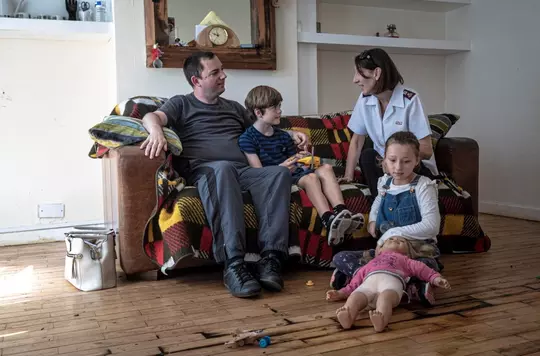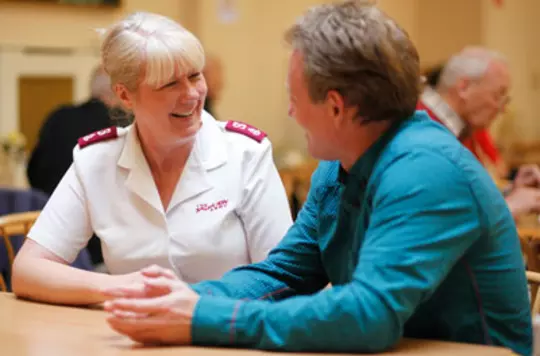Saving money

Save money and cut costs
The Salvation Army is devoted to provide ways for people to save money and spend less.
In the most deprived areas of the country, unemployment and social exclusion are key challenges facing many local people. The Salvation Army seeks to serve those in need by providing alternatives.
Cafés
Healthy tasty food at affordable prices.
Salvation Army cafés are great places to relax and unwind. The combination of our friendly staff and inexpensive prices make them somewhere you'll want to visit again and again.
Charity shops
The Salvation Army was one of the pioneers in charity shops in the nineteenth century.
Our mission is the same today as in the 1840s. We make sure that everything we sell is good quality and affordable.
It's easy to find brand new clothes and household items on the high street - tempting new styles, different sizes and healthy stock availability means there's an abundance of choice out there. However, taking the time to browse in one of our charity shops might not only save you pounds, you could also walk away with something unique knowing your cash has gone towards helping those in need across the UK...
Top five tips for charity shop bargain hunting
1. Embrace the art of rummaging
The joys of charity shops are the one-off items you will find at affordable prices, so rummaging is essential. But it’s important to know that many charity shops are now taking on the feel of a retail outlet; in many of our Salvation Army shops you will find clothes in size order and sometimes items separated into colour shades. We also make sure items are displayed seasonally so you’re more likely to find summer sandals in late spring and winter coats when the weather turns chillier.
2. Look for school essentials
School uniforms can be expensive as children grow up fast. However, you will often find charity shops stocking local schools’ uniforms, so be on the lookout. When your children have outgrown their uniforms, make sure you donate them to your local charity shop. And why not encourage other families to do the same – parent networking websites or local community groups are a great way of doing this.
3. Ask yourself, "do I need a new one"?
We appreciate there are some items you will want to buy brand new. But how about a second-hand cutlery set? Or a kettle? Things don’t need to match – in fact, why not fill your cupboard with an eclectic mix of dinner plates instead? They’ll cost a fraction of the price you’ll find in department stores.
4. Look out for unique gifts
Charity shops are wonderful sources of inexpensive items such as stocking fillers. Costume jewellery doesn’t have a label that will identify where it’s from and fun tea mugs are a great gift for co-workers. You probably won’t have spent more than a fiver but you’ll have given your friend or family member something unique and thoughtful.
5. Always give back
Charity shops are always on the hunt for quality items, so if you shop in them, make sure you donate your own wardrobe or household items when there’s no longer any love lost!
The beauty of a charity shop bargain is two-fold of course. Not only can you pick up a steal, the pennies you spend help a vital cause. In the case of The Salvation Army, the money raised from charity shops goes towards a wide variety of humanitarian needs in the UK and Ireland, such as homelessness and addiction services, care for older people, help at emergency incidents and support for adult victims of human trafficking, as well as local community projects.
Grow your own
The Salvation Army runs community vegetable garden where people can grow produce. By refurbishing a disused area of land keen gardeners can grow their own fruit, vegetables and herbs in individual allotments, with surplus produce sold back to local people.
For example, in Newcastle there is an extensive waiting list for allotments but community vegetable gardens run by The Salvation Army are helping meet the demand. The new allotments provide fresh food at affordable prices, and help improve diets.
A Newcastle Salvation Army church spent 18 months refurbishing a disused site with the help of local business Aspire, who use the project to give new opportunities and training to apprentices in horticulture. The allotments contain sunflowers, as well as pumpkins and runner beans
Steven, who worked on the project, explained: "When we first started work on the site it was a mess. It was completely overgrown but now it looks really nice and there are all sorts of things growing there. I am amazed at how it looks now. I will keep coming back to help maintain it but most of the work will be down to the people who own the plots."

Local support for jobseekers
Employment Plus Locals offer information and guidance within a supportive environment

Emergency assistance
Providing the basics and supporting people on a path to dignity and not to dependence

Saving money
Our cafés and community projects are the front line of the battle against poverty in the UK

Budget and debt advice
We provide tailored support to help you with your finances.